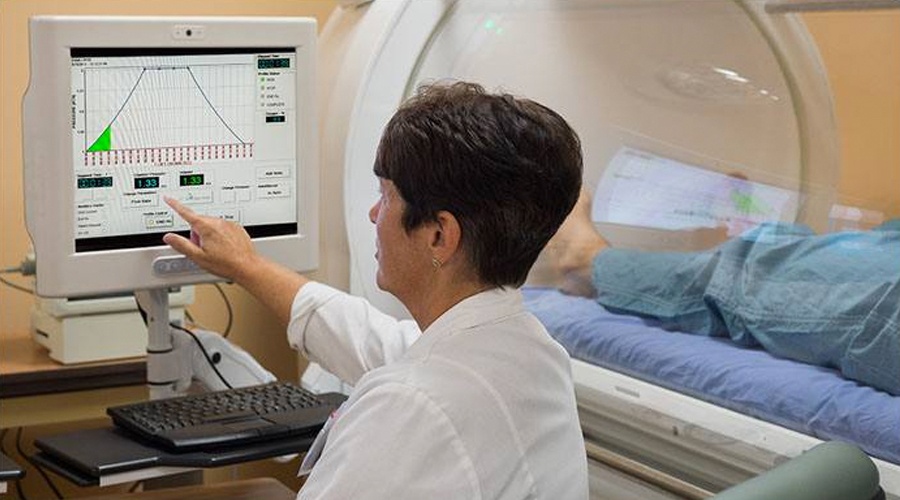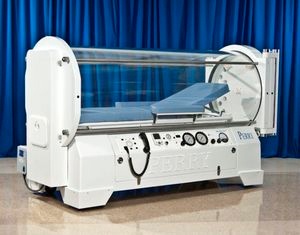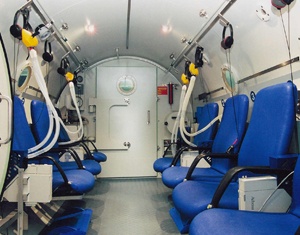Types of Hyperbaric Chambers

THIS ARTICLE AT A GLANCE:
Hyperbaric oxygen therapy is an innovative medical treatment that involves patients breathing 100% oxygen at a higher-than-normal atmospheric pressure, delivered through a device called a hyperbaric chamber.
There are two types of chambers: medical grade and non-medical grade. Another type device is "mild," or “soft," chamber. These are non-medical grade. They differ in their delivery scope, use, and effectiveness.
What Exactly is a Hyperbaric Chamber?
In short, a hyperbaric chamber is a pressurized vessel.
The amount of pressure applied during a treatment session depends on several factors specific to the patient, including the condition being treated and the patient’s response to treatment. Patients are treated either in an individual chamber, called a monoplace hyperbaric chamber, or in one that can hold several people, called a multiplace hyperbaric chamber. An alternative to a traditional monoplace chamber is a device called a "mild," or “soft," chamber. However, it differs in its delivery scope, use, and effectiveness.
Monoplace and multiplace hyperbaric chambers are FDA-approved for 14 different conditions, and many more indications have been or are currently being, studied using these chambers. Mild hyperbaric chambers, or "soft" chambers, are only FDA approved for Acute Mountain Sickness and have not been FDA approved for any other condition.
Medical Grade Chambers
These are the chambers we use at Hyperbaric Medical Solutions offices.
Inside medical grade hyperbaric oxygen chambers, patients breathe 100% medical grade oxygen, prescribed and supervised by a physician, at a specific atmospheric pressure for a designated amount of time. A specially trained hyperbaric technician monitors each patient from outside the chamber during treatment at all times.
These devices are FDA approved. The Food and Drug Administration (FDA) currently recognizes HBOT for 14 conditions, which are generally covered by insurance.
HBOT may also have benefits for other conditions not yet approved by the FDA. Many of those conditions have undergone significant research and is commonly utilized around the globe. Treatment for conditions not yet approved by the FDA is generally not covered by insurance and is not available at hospital-based hyperbaric centers. The research on both the covered and non-covered conditions is based on the use of true medical grade hyperbaric chambers.
Monoplace Hyperbaric Chambers
 Photo Credit: Medical Expo
Photo Credit: Medical Expo
A "monoplace HBOT chamber" is a hyperbaric oxygen therapy chamber designed to hold only one patient at a time. It is a single-person pressurized chamber where a patient lies down and breathes 100% oxygen during treatment; it often resembles a long, clear plastic tube similar to an MRI machine, allowing the patient to be fully enclosed while pressurized.
Monoplace Hyperbaric Chambers Monoplace chambers treat one patient at a time. These clear chambers allow patients to lie comfortably while breathing 100% oxygen under pressure. They eliminate the need for masks or hoods and are monitored by trained technicians for safety and comfort.
Multiplace Hyperbaric Chambers
 Photo Credit: Clife
Photo Credit: Clife
A "multiplace HBOT chamber" is a large, pressurized chamber designed to allow multiple patients to receive Hyperbaric Oxygen Therapy (HBOT) simultaneously, where each person wears a mask or hood to breathe pure oxygen while the chamber is pressurized with regular air, unlike a monoplace chamber which only fits one patient at a time.
Mild Hyperbaric Chambers
 Photo Credit: One Base
Photo Credit: One Base
Mild hyperbaric chambers, otherwise known as "soft" hyperbaric chambers, are “bags” made of polyurethane or canvas material. These chambers reach a much lower pressure and only compress room air, which contains about 21% oxygen vs. the 100% medical grade oxygen used in a traditional medical grade hyperbaric chamber. These are not designed to be used with oxygen.
Despite these key differences, “soft chambers” are often marketed as effective as the medical grade chambers in a host of conditions, even if these claims have not been studied or proven.
HMS Locations
Find an HMS location near you.
New York
Woodbury, NY
(516) 757-0716
Learn MoreNew York
Manhattan
(646) 760-3474
Learn MoreFlorida
Fort Lauderdale
(954) 507-3913
Learn MoreFlorida
Miami
786-550-1975
Learn MoreMassachusetts
Randolph
(781) 961-7887
Learn More
Written by Alan Katz, MD, FUHM, FACEP, FAAEM
Dr. Alan Katz, National Medical Director of Hyperbaric Medical Solutions (HMS), is double board certified in Emergency Medicine and Hyperbaric Medicine. He directs clinical operations, as well as education and research initiatives for HMS, particularly in exploring the use of hyperbaric oxygen therapy....
Read More
 Photo Credit:
Photo Credit: 


